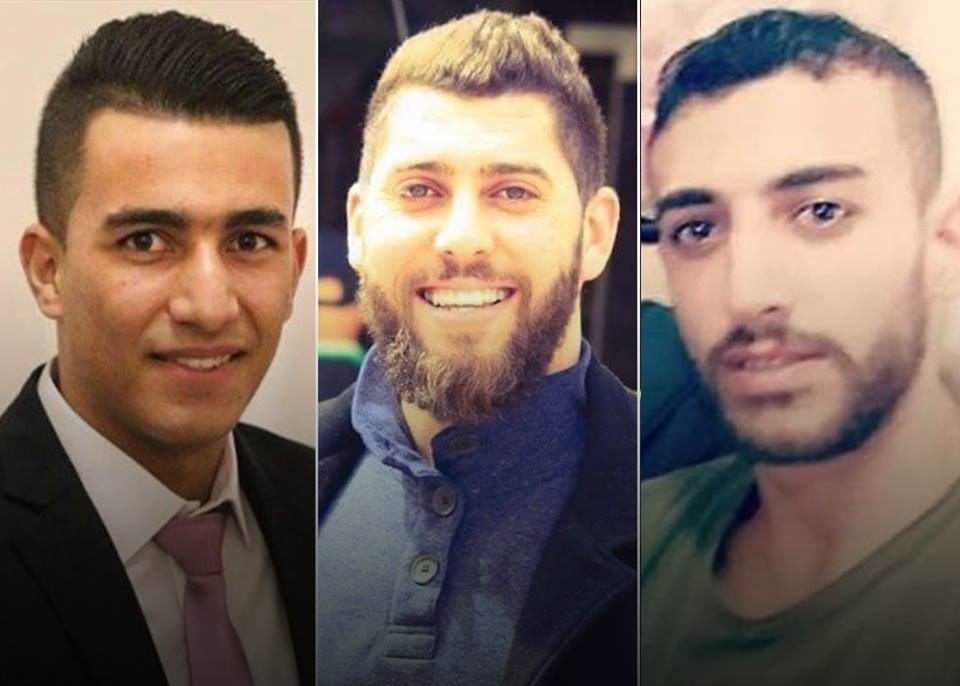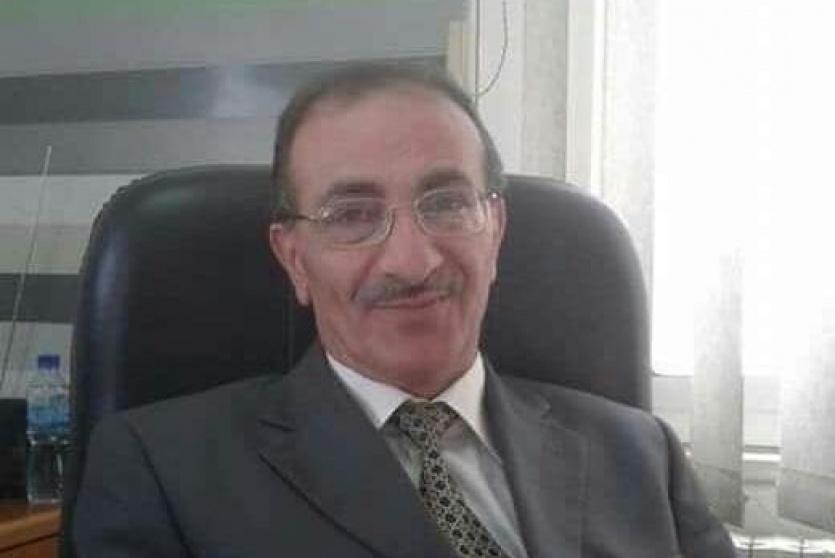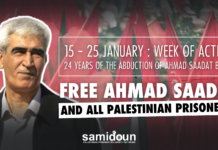
On 13 December 2018, Israeli occupation forces shot down four Palestinians, including several resistance fighters who had evaded their pursuit for months. Ashraf Na’alwa, 23, was killed by occupation forces who attacked the home where he was staying in Askar refugee camp near Nablus. He had been pursued by occupation forces since he carried out an armed resistance operation on 7 October in the illegal colonial settlement of Barkan in the northern West Bank of occupied Palestine in which two settlers were killed.
Na’alwa, a Palestinian worker at a factory in the colonial settlement, evaded occupation forces for months. During that time, his entire family was repeatedly harassed and attacked by occupation forces. His mother, sister, brother and father were all repeatedly detained and interrogated, while his home village of Shweika near Tulkarem was subjected to ongoing attacks, raids and intensive surveillance. Many of his family members remain behind bars as we remember him today. Occupation forces ordered his family home demolished, a tactic of collective punishment that the Israeli occupation continued from the former British colonial mandate over Palestine.
Israeli sources reported that Na’alwa’s location was finally revealed under “harsh interrogation,” usually a euphemism for torture under interrogation. The occupation forces deliberately aimed to kill Na’alwa, who resisted until the last moment; indeed, Israeli headlines bragged about “eliminating” the “terrorist.” Occupation forces reportedly chased Na’alwa through the camp for hours before surrounding him in the building. Around the bloody scene, occupation forces seized more Palestinians, accusing them of “providing aid” to the “wanted” resistance fighter.
The extrajudicial execution of Ashraf Na’alwa did not come alone today. Saleh Omar Barghouthi, 29, the son of former Palestinian prisoner Omar Barghouthi, who served 25 years in Israeli prisons, was shot dead near the village of Sarda near Ramallah. Barghouthi, from Kobar village, carried out an armed resistance action at Ofra illegal colonial settlement on Sunday, 9 December, wounding seven settlers. Occupation forces attacked the his taxi he drove, seized him and shot him dead, according to Palestinian witnesses at the scene.
Barghouthi is also the nephew of Nael Barghouthi, one of the longest serving Palestinian prisoners, with 39 years in Israeli prison. Saleh’s brother, Asem, has spent 10 years in Israeli occupation prisons, while another uncle, Jacir, was deported to Gaza when released from Israeli prison.
Also on Thursday morning, Israeli occupation forces in Jerusalem shot Majd Mteir, 26, a Palestinian refugee from Qalandiya camp, ten to twelve times in a row. Witnesses said that Mteir was left lying on the ground bleeding for 40 minutes before his death. Occupation forces accused him of attempting to stab Israeli armed “border police” in Jerusalem.
These killings were carried out in a coordinated fashion, alongside the arrest of dozens of Palestinians on the same night. Clearly, these were intended to be a deadly blow not only against these strugglers, but also the Palestinian resistance as a whole.
Nevertheless, ensuing events made clear that the military power of the occupation and its extrajudicial executions would only inflame Palestinian resistance further. Three Israeli soldiers at the illegal colonial settlement of Givat Asaf were shot dead by unknown Palestinian resistance fighters, who left the scene, withdrawing from the area, later on Thursday morning. This response indicated that Palestinian resistance forces did not accept that the blood of these young strugglers should be spilled casually and without cost to the colonial occupier.
The assassination raids recall previous attacks, like those on Basil al-Araj and Moataz Washaha, Palestinian strugglers targeted for Israeli “elimination.” The policy of extrajudicial killings and assassinations by the Israeli state stretches back years and beyond borders, targeting resistance strugglers, local organizers and national leaders: Ghassan Kanafani, Abu Ali Mustafa, Sheikh Ahmad Yassin, Khaled Nazzal, Fathi Shiqaqi, Abu Jihad, Abdel-Aziz Rantisi and many others, including some of the Palestinian people’s brightest writers, poets and emissaries to the world. Despite decades of assassinations and killings, the Palestinian resistance has not been crushed. Instead, it has continued to adapt, survive and grow, resisting a brutal, colonial occupation and its imperialist sponsors despite vast disparities in wealth and resources.

Israeli occupation forces have imposed a harsh siege on Ramallah and the surrounding villages. They shot dead 60-year-old Hamdan Arda, originally from the village of Arraba near Jenin, in his vehicle near el-Bireh, accusing him of attempting to run over soldiers. Arda was returning home from his aluminum factory when he was shot. As he lay inside his car, the soldiers refused to allow the Red Crescent ambulance to reach him and provide treatment. The killing of Arda came alongside attacks by soldiers and settlers on Palestinian cities and villages. Six Palestinians were wounded in el-Bireh, shot by live ammunition and rubber-coated metal bullets. Illegal colonial settlers attacked Palestinians and their vehicles in cities and towns throughout the West Bank of occupied Palestine, while Palestinians took to the streets in protest.
Palestinian political parties, including Hamas, Islamic Jihad, the Popular Front for the Liberation of Palestine, the Democratic Front for the Liberation of Palestine and even Fateh called for mobilization inside and outside Palestine to confront the escalating occupation attacks. Meanwhile, Palestinian Authority President Abu Mazen attempted to distance himself from “violence,” while leaving the PA’s security coordination with the Israeli occupation intact.
These events come only a week after the latest effort by Israel and the United States at the United Nations to attack and criminalize Palestinian resistance. An attempt to pass a General Assembly resolution against Palestinian resistance actions in Gaza failed. This was only the latest attempt to redefine international principles in the interests of imperialism, seeking to undermine the position expressed UN’s General Assembly resolution 34/43 (1982). This document supporting Palestinian rights as well as those of African peoples fighting colonization and apartheid “Reaffirm[ed] the legitimacy of the struggle of peoples for independence, territorial integrity, national unity and liberation from colonial and foreign domination and foreign occupation by all available means, including armed struggle…Strongly condemn[ed] those Governments that do not recognize the right to self-determination and independence of all peoples still under colonial and foreign domination and alien subjugation, notably the peoples of Africa and the Palestinian people.”
Samidoun Palestinian Prisoner Solidarity Network highlights the importance of global solidarity with the Palestinian people, their liberation movement and their resistance. We remember and honor Ashraf Na’alwa, Saleh Barghouthi, Majd Mteir and Hasan Arda, as we remember the over 200 martyrs of today’s intifada, the Great March of Return in Gaza.
As we look back on 31 years of the First Intifada and see its spirit reflected today throughout occupied Palestine, we urge people of conscience around the world to organize protests and actions to stand with Palestinians confronting occupation, colonization and imperialism. We also urge communities, municipalities, university groups and trade unions to escalate the boycott of Israel, including economic, academic and cultural boycott – and especially a military embargo of the occupation state.
The lives of these strugglers shall not be lost in vain, but will live on as symbols of resistance and the ability of an indigenous people to struggle by all means despite the most challenging odds and the most disadvantageous balance of power. From the river to the sea, Palestine will be free!
Discover more from Samidoun: Palestinian Prisoner Solidarity Network
Subscribe to get the latest posts sent to your email.




